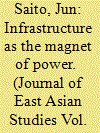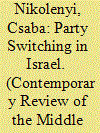| Srl | Item |
| 1 |
ID:
092264


|
|
|
|
|
| Publication |
2009.
|
| Summary/Abstract |
By examining party-switching decisions among members of Japan's Liberal Democratic Party (LDP), this article shows how distributive policy programs exclusively available to the governing party attract incumbents to the party in power. In a stable electoral environment where the government party is likely to stay in power, legislators elected from infrastructure-poor constituencies are effectively tied to the party. However, when the party's electoral prospects are uncertain, legislators behave more sincerely and switch parties to match their policy preferences. It is also found that defectors elected from infrastructure-poor constituencies tended to return to the LDP once the party installed a stable surplus coalition.
|
|
|
|
|
|
|
|
|
|
|
|
|
|
|
|
| 2 |
ID:
169987


|
|
|
|
|
| Summary/Abstract |
In January 2011, former Israeli Prime Minister Ehud Barak issued a surprising announcement to take four other members of his Labor Party’s Knesset faction with himself to set up a new political party, Haatzmaut (Independence). The conditions under which this split took place illustrate the ways in which the Israeli anti-defection law, passed in the 12th Knesset, incentivizes the behavior of elected legislators who seek to exit from the party that they were elected to represent. This article shows that the anti-defection law cannot keep a legislative party together that suffers from weak internal cohesion. In fact, by imposing numerical criterion (1/3) on prospective party switchers, the anti-defection law prolongs internal disunity, thereby further weakening an already low level of cohesion.
|
|
|
|
|
|
|
|
|
|
|
|
|
|
|
|
| 3 |
ID:
128941


|
|
|
|
|
| Publication |
2014.
|
| Summary/Abstract |
Patterns of party switching in Taiwan have played an important role in the development and relative stability of its party system. In this study I aim to track key patterns of how politicians switched their partisan affiliation during the critical periods of party system change. I examine the level of party switching, where party switching was most prevalent, when switching was most common, and the most common types of switching since the advent of multiparty politics in Taiwan. Party switching is an important phenomenon in the development of party politics in Taiwan but thus far it has received surprisingly little systematic attention. This is the first comprehensive attempt to tackle this understudied topic.
|
|
|
|
|
|
|
|
|
|
|
|
|
|
|
|